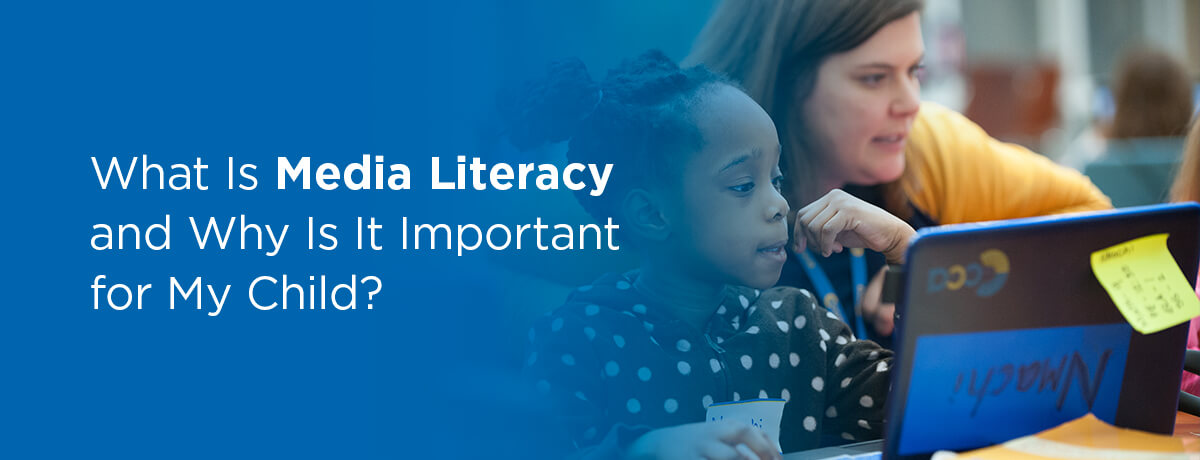Enrollment Now Open for Second Semester. Click Here
Enrollment Now Open for Second Semester. Click Here

Parents often ask whether the media their children engage with is good for them, and these are important questions as our world becomes more digital. Media literacy is a relatively new concept, and most people born before the most recent generation, Generation Z, likely won’t have encountered this in school. However, since children interact with various media platforms every day, education has come to recognize media literacy as an essential skill for students’ personal and professional development.
Continue reading to learn more about media literacy for children in school and how it can benefit their everyday lives.
With the average U.S. citizen spending 721 minutes of their day on media, there’s no question it plays an essential role in our daily lives. However, if we’re already spending a majority of our time using media, what does it mean to have media literacy skills? Media literacy refers to skills that aid us in interpreting and analyzing material we encounter while we’re online. This media includes various platforms, such as:
Having media literacy means we can decode subtle messaging in the content we encounter and ask ourselves questions such as who produced this content and what is the intent? Often, the purpose of media like commercials and advertisements is overt — to sell an item or product. But sometimes, messaging within media is subtle. Websites and social media posts that don’t appear to be advertisements may intend to sell or market something. Being able to distinguish a piece of media’s intent is integral for your child to operate safely online. While there is positive messaging in media, we all know there are plenty of negative messages swirling around the web. For children especially, being able to navigate around these negative messages is crucial to their health and happiness and makes them better digital citizens.
Children from eight to eighteen spend about 7 hours and 38 minutes a day looking at media, ranging from social media to television to the news. Each distinct media platform is unique and has its own unwritten rules. For students, media literacy is essential to being able to consume and participate in online spaces responsibly. Whether they’re researching a project or scrolling through their social media feed, it is crucial to know how to interpret the information they come across.
Some of the benefits of educating students in media literacy include:
Essentially, media literacy teaches your child how to navigate through the constant messaging they interact with on a daily basis. In doing so, they can critically think about the intent and purpose of the communications they receive.
With today’s technological classrooms, media literacy and education go hand in hand. Boosting students’ media literacy sets them up for success throughout their educational, professional, and personal lives. In the classroom, media literacy helps children make connections between what they learn in school and the things they use outside of school, especially for entertainment.
Whenever your child interacts with media in the classroom, in addition to gleaning important information from the media, they’re also taking in other subtle cues. There are five key questions teachers commonly ask to get students to critically think about the messaging they encounter:
In getting students to ponder these questions, teachers give them the skills they need to accurately interpret media, whether they use it in or out of the classroom. Some other activities teachers may use to enhance your student’s media literacy skills include:
Incorporating media into the classroom is successful for a number of reasons, but the main benefits involve creating a positive attitude towards learning and encouraging students to digest and question the media they encounter.
Media literacy becomes especially important in middle and high school when students gain more independence in choosing the media they interact with. If you’re thinking about enrolling your child in CCA, know they will be interacting with media and building their media literacy skills in virtually every class. Using school-provided laptops and technology, your child will learn how to navigate various new media platforms successfully.
CCA strives to boost student media literacy by implementing a broad range of activities. Our teachers receive specialized training in online instruction, which includes building literacy skills through media platforms. With CCA’s focus on individualized education, you can be sure your child’s curriculum is tailored to their unique needs and interests.
Discover the benefits of an individualized curriculum at CCA. Your child will enjoy activities that will assist in their personal and educational growth with teachers who are committed to their success. Plus, with CCA’s technology resources, your child will gain essential skills in media literacy. For more information on CCA’s technology for online learning, you can request more information or contact us to speak with a knowledgeable representative.
Enrollment Now Open for Second Semester. Click Here